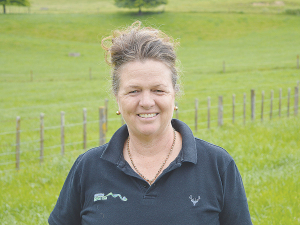State of the Dairy Nation 2024/25: DairyNZ Highlights Record Milk Production and Export Growth
DairyNZ's chief executive Campbell Parker says the 2024/25 dairy season reinforces the importance of the dairy sector to New Zealand.
 DairyNZ chair Tracy Brown says the new rate strikes a balance between “a broad spectrum of farmer views”.
DairyNZ chair Tracy Brown says the new rate strikes a balance between “a broad spectrum of farmer views”.
Dairy farmers will be paying a new levy rate of 4.5c/kgMS - an extra 0.9c/kgMS - to industry-good body DairyNZ from June 1 this year.
DairyNZ chair Tracy Brown told Dairy News that the new rate, approved by the board, strikes a balance between "a broad spectrum of farmer views" received during a month-long consultation process.
Brown notes the board has also given farmers some certainty by aiming to hold the levy "at no more than this rate for a minimum of three years".
"Board members read every piece of submission from farmers and thought long and hard before settling for 4.5c/kgMS," she says.
The current rate of 3.6/kgMS was set when DairyNZ was established 16 years ago. The new rate would increase a farmer's annual milksolids levy payment by $800 per 100,000 kgMS.
The levy rate is different to the six-year milksolids levy vote during which famrers vote on their continued support for DairyNZ. This will take place next year.
Brown says she was happy with consultation process that included 12 events and attracted feedback from 1588 farmers, representing 18% of total milksolids.
"The consultation was held in February - a busy period on the farm and many farmers were grappling with effects of the drought," she says.
"I'm really grateful that they came and engaged with us."
Brown says the 18% turnout by milksolids "is similar to the turnout during director elections".
The new rate will allow DairyNZ to continue supporting the country's dairy farmers to lift profitability and sustainability through science and research, policy and advocacy and extension behind the farm gate.
"Some farmers endorsed our work and want us to do more, especially across science and research, while others wanted a stronger commercial focus to keep costs down, or the levy rate to remain unchanged," says Brown.
"In making the decision, the board carefully considered the feedback, how best to support farmers and provide certainty into the future, the financial sustainability of DairyNZ, and sector resilience.
"Importantly, I want farmers to know that we've heard their feedback on areas important to them. We will deliver improvements including in farmer engagement, transparency around levy spending and return on their investment, and our science and research programme to keep the focus sharp on productivity, resilience and sustainability."
She says DairyNZ is the only organisation that supports dairy farmers with independent scientific research for the sector alone.
"Therefore, we've committed to delivering the right science in the right way on-farm and proving its value every step of the way.
"Our vision is to ensure the levy is the best investment of every New Zealand dairy farmer. This commitment underpins everything we do. We will share more details about these improvements over the coming months.
"Dairy farmers can be confident DairyNZ will continue to back them with the right tools and support to ensure they have a positive future and can grow their businesses."
Strategic Priorities
At the new levy rate, DairyNZ will maintain its focus on three strategic priorities over the next three years: accelerating and resilient farms, and enabling sustainable and competitive dairying.
In line with its strategy reset last year, DairyNZ is working with partners to reduce duplication, strengthen policy advocacy to ensure practical and enduring settings for farmers, deliver smarter, targeted science by focusing on applied research that provides on-farm benefits, and rolling out improved extension events.
DairyNZ says its management team continues to apply a more rigorous commercial focus across the organisation, including cutting costs by $5.5m in the past year and refocusing efforts on high-value projects.
The industry-good body passes on 0.8c/kgMS from the levy to the Tb free programme.
The Meat Industry Association of New Zealand (MIA) today announced that Chief Executive Officer Sirma Karapeeva has resigned from the role.
The winners of the 2026 Hawke’s Bay/Wairarapa Dairy Industry Awards were announced at the annual awards dinner held at Copthorne Solway Park in Masterton on Thursday evening.
Environment Southland is welcoming this week’s decision by the Environmental Protection Authority (EPA) to approve the release of Blaptea elguetai, a leaf‑feeding beetle that will help control the highly invasive Chilean flame creeper.
This March, the potato industry is proudly celebrating International Women’s Day on 8 March alongside the International Year of the Woman Farmer, recognising the vital role women play across every part of the sector — from paddocks and packhouses to research, leadership, and innovation.
Fruit trader Seeka posted a record profit and returns to shareholders in 2025.
Recent weather events in the Bay of Plenty, Gisborne/Tairawhiti, and Canterbury have been declared a medium-scale adverse event.
OPINION: Staying with politics, with less than nine months to go before the general elections, there’s confusion in the Labour…
OPINION: Winston Peters' tirade against the free trade deal stitched with India may not be all political posturing by the…